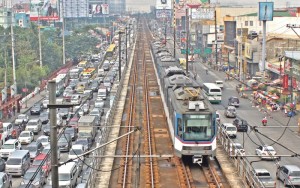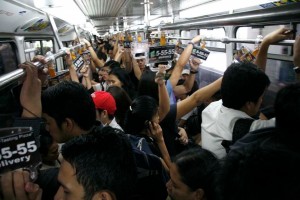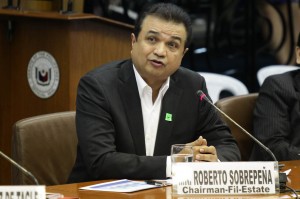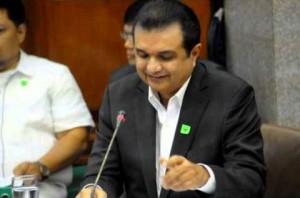By Mike Frialde | philstar.com | Updated October 3, 2014, 7:55pm
MANILA, Philippines – An executive of the Metro Rail Transit Corporation (MRTC) on Friday expressed support for the plan of the Department of Transportation and Communications (DOTC) to upgrade and rehabilitate the MRT-3 system.
In a statement, Robert John Sobrepeña, chair of the Fil-Estate group – one of the shareholders of the Metro Rail Transit Holdings (MRTH II), the company that owns the Metro Rail Transit Corporation (MRTC) – said the MRTC, either by itself or through related companies, has previously submitted proposals to the DOTC for the supply of additional trains as well as the upgrade of mass transportation system.
“MRTH II supports the effort of the government to upgrade and rehabilitate the MRT-3 System and bid out the maintenance contract to a technically and financially qualified contractor. However, it is our belief that it would be to the best interest of the MRT-3 System and the riding public that the single point of responsibility be reinstated by adding the rehabilitation and upgrading of the System to the contract of the maintenance contractor under a long term contract,” Sobrepeña said.
“With all of these implemented, we are confident that the pressing concerns to ensure the safety and convenience of the riding public shall be achieved,” he added.
Sobrepena however cautioned the DOTC to only award the project to a “technically and financially qualified contractor.”
Sobprepeña added that the private owners of the MRTC have always supported the proposed upgrade and purchase of additional trains for the MRT-3 System since 2002. He added that they have even made several proposals to the DOTC for the system’s upgrade.
Sobrepeña said the DOTC advised them that the before any upgrade is made, a “triggering event” must happen to signal capacity expansion.
That triggering event, said Sobrepeña was for MRT ridership to reach 350,000 passengers daily which is the maximum ridership volume of the MRT-3’s existing 60 trains.
When the “triggering event” happened, Sobrepena said the MRTC again renewed its upgrade offer in 2004. He said nothing happened as the DOTC merely created a technical committee to study their proposal.
In 2007, Sobrepena said the MRTC again proposed to provide an additional 48 cars to the system as part of the capacity expansion and upgrade of the MRT-3 System.
“It is unfortunate that the DOTC failed to act on any of the proposals, thereby losing the opportunity for government to reap the benefits of having additional trains and upgraded system,” Sobrepeña said.
“DOTC proceeded, without any coordination and consultation with MRTC and in violation of existing agreements, bidded and purchased 48 Chinese trains. Thus, Metro Rail Transit Holdings II, as owner of MRTC, was constrained to initiate arbitration to protect the MRT-3 System and to ensure public safety against any possible damages and accidents that might occur due to possible incompatibility issues of the Chinese trains, especially after hearing that the Chinese manufacturer has never made double articulated light rail vehicles,” he added.
He also lashed at the DOTC for terminating its contract with maintenance provider Sumitomo on October 2012.
“DOTC effectively lost one of the most important features of the MRT-3 System, namely, the single point of responsibility. The loss of said single point of responsibility has now led to the current state of finger pointing as to who is at fault for the sorry state of the MRT-3 System today,” he said.
Malacañang earlier announced that government has allocated P2.584 billion for the repair and upgrade of the country’s light rail systems.
Sec. Herminio Coloma Jr. of the Presidential Communications Operations Office said Transportation and Communications Sec. Joseph Emilio Abaya was tasked to take all necessary measures to ensure the safety and reliability of the mass transport service provided by MRT-3 and Light Rail Transit 1 and 2.
Coloma said P1.156 billion would be used for the overhaul and repair of 28 cars, P870 million for upgrading power substations and ancillary systems, P184.7 million for upgrading the signaling system and computer software, P110 million for upgrading radio communication systems, P119.5 million for replacement of old rail tracks, P94.5 million for replacement of traction motors and P50 million for upgrading and replacement of elevators and escalators.
Coloma said procurement of goods and services are either ongoing or will start next month. The DOTC said most of the projects would be fully implemented in 2015.
He said Abaya also informed the president about the delivery of 48 new coaches starting September 2015 to increase the capacity of MRT-3 by 66 percent and improve headway (gap between trains) to 2.5 minutes.





